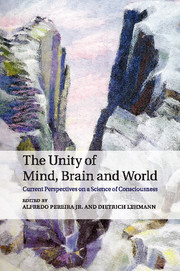
-
Select format
-
- Publisher:
- Cambridge University Press
- Publication date:
- July 2014
- September 2013
- ISBN:
- 9781139207065
- 9781107026292
- 9781107617292
- Dimensions:
- (228 x 152 mm)
- Weight & Pages:
- 0.65kg, 368 Pages
- Dimensions:
- (229 x 152 mm)
- Weight & Pages:
- 0.42kg, 358 Pages
- Subjects:
- Life Sciences, Cognitive Psychology, Psychology, Cognition
You may already have access via personal or institutional login- Subjects:
- Life Sciences, Cognitive Psychology, Psychology, Cognition
Book description
Issues concerning the unity of minds, bodies and the world have often recurred in the history of philosophy and, more recently, in scientific models. Taking into account both the philosophical and scientific knowledge about consciousness, this book presents and discusses some theoretical guiding ideas for the science of consciousness. The authors argue that, within this interdisciplinary context, a consensus appears to be emerging assuming that the conscious mind and the functioning brain are two aspects of a complex system that interacts with the world. How can this concept of reality - one that includes the existence of consciousness - be approached both philosophically and scientifically? The Unity of Mind, Brain and World is the result of a three-year online discussion between the authors who present a diversity of perspectives, tending towards a theoretical synthesis, aimed to contribute to the insertion of this field of knowledge in the academic curriculum.
Reviews
‘The academic study of consciousness bubbles nowadays with fascinating findings and ideas; this book offers cutting edge accounts of some of the best of these. Covering topics ranging from brain microstates associated with cognition to conceptual frameworks needed to make sense of the whole field, it merits a place in every university library.’
Chris Nunn - Associate Editor, Journal of Consciousness Studies
Contents
Metrics
Altmetric attention score
Full text views
Full text views help Loading metrics...
Loading metrics...
* Views captured on Cambridge Core between #date#. This data will be updated every 24 hours.
Usage data cannot currently be displayed.
Accessibility standard: Unknown
Why this information is here
This section outlines the accessibility features of this content - including support for screen readers, full keyboard navigation and high-contrast display options. This may not be relevant for you.
Accessibility Information
Accessibility compliance for the PDF of this book is currently unknown and may be updated in the future.


